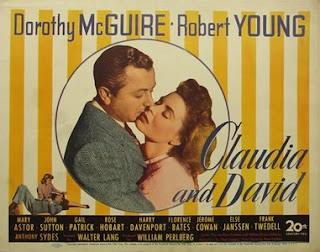When asked several years ago to list five movies I would have with me on a desert island, I Remember Mama was one of my choices. Our group had not watched it in recent memory (though all but one member had seen it before), and when the opportunity arose to view it, we were thrilled. No matter how many times you see this film, it is one of which you will never tire.
I Remember Mama is a series of vignettes, all centered around the Hanson family. Mama Marta (Irene Dunne) and Papa Lars (Philip Dorn) came to the United States just after their marriage to join Marta's family - Uncle Chris Halvorsen (Oskar Homolka), and sisters Jenny (Hope Landin), Sigrid (Edith Evanson), and Trina (Ellen Corby). The children were all born in San Francisco - Nels (Steve Brown), Katrin, Christine (Peggy McIntyre), Dagmar (June Hedin), and Sigrid's son Arne (Tommy Ivo). The Hansons and Halvorsens are hard working people. They are not wealthy, but they are getting by, and Marta and Lars are working and saving so that their children can have a better life through education.
There are many memorable performances. But the film must anchor itself on Mama, and Irene Dunne does not disappoint. She was not the first choice for the role - Greta Garbo was approached (and said no), Katina Paxinou was also considered (the family would have been changed to Greeks), and Marlene Dietrich campaigned for the part (she was deemed too sexy) (AFI catalog). When Irene Dunne was asked, she said yes, on the condition that the director was selected from a list she provided. Luckily, George Stevens (his first film since he returned from Europe during World War II), who was already on the film was also on Ms. Dunne's list (TCM article). He guides her to a subtle, yet strong performance as the heart of this family. Perhaps the incident that most demonstrates Ms. Dunne's power is that of Dagmar's hospitalization. Ms. Dunne gives us a purposeful and wise woman who does what is needed to get to her ailing child.
His counterpoint is Uncle Chris. Oskar Homolka provides a brusk, noisy man who loves his family, but brooks no nonsense. His conversation with his nieces, who he discovers fear him, is a remarkable one. His care for his grand-nephew Arne is warm and understanding - the scene with young Tommy Ivo is handled beautifully. Uncle Chris is a man who likes to shock. Marta knows this - watch her attitude to Jessie Brown (Barbara O'Neill in another beautifully, subtle performance), which is why she is the only one of his nieces Uncle Chris can stand!
Ms. Bel Geddes started on stage, most notably as the original Maggie in Cat on a Hot Tin Roof. After well-received performances in six films (including Panic in the Streets), she was blacklisted. Eventually she was cast by Alfred Hitchcock in Vertigo; he included her in four episodes of his television show Alfred Hitchcock Presents, among them "Lamb to the Slaughter," perhaps the most wicked of all his teleplays. In 1978, she joined the cast of Dallas as Miss Ellie Southworth Ewing, the matriarch of the family; with the exception of a one-year break in which she was recovering from surgery, she played the part until 1990; at which point, she retired from acting. Married twice, with two daughters, she died of lung cancer in 2005.
Some portions of the movie were filmed in San Francisco, which adds to the verisimilitude of the story. When it opened at Radio City Music Hall in New York City, Bosley Crowther's New York Times review was glowing. It was also #24 on the list of top grossing films for 1948 (Variety). It was nominated for 5 Academy Awards: Irene Dunne for Actress (she lost to Jane Wyman in Johnny Belinda); Oscar Homolka for Supporting Actor (lost to Walter Huston in Treasure of the Sierra Madre); Barbara Bel Geddes and Ellen Corby for Supporting Actress (lost to Claire Trevor in Key Largo); and Nicholas Musuraca for Cinematography. Ellen Corby did win the Golden Globe for Supporting Actress.
The story was based on the novel Mama's Bank Account by Kathryn Forbes, which became a Broadway play by John Van Druten. The play starred Mady Christians and introduced Marlon Brando as Nels - Oscar Homolka was the only cast member to appear in the film. Later, Irene Dunne, Oscar Homolka, and Barbara Bel Geddes reprized their roles for the Lux Radio Theatre production in August 1948. The story aired as a television series with Peggy Wood, which ran from 1949 to 1957. In June of 1961, British ITV did a television play with Stella Bonheur as Mama. There were also two musical versions. One, Mama, featuring Celeste Holm in the title role, but closed in 1972 before it reached Broadway. In 1979, it was made into a Broadway musical (with music by Richard Rogers) I Remember Mama with Liv Ullmann as Mama.
If you've never seen this film, please consider finding it. It is heartwarming, but in a good way. We'll leave you with this trailer:




















